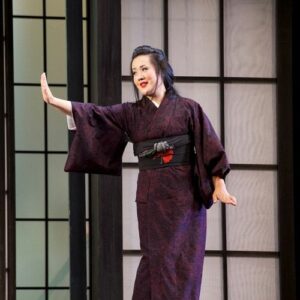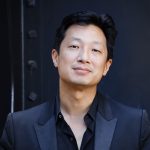Melinda Bargreen | 21 OCT 2022
At first, Yasko Sato (佐藤康子) didn’t know anyone in the cast when she arrived for rehearsals of The Atlanta Opera’s upcoming Madama Butterfly.
Now, she feels surrounded by good friends.
“The singers are amazing,” Sato said in a phone interview. “Now I have the best colleagues, and it’s a very friendly atmosphere. They’re such great people to sing with, I feel this is a production not to be missed!”
Sato already has worked with the production’s stage director Tomer Zvulun, whom she first met in 2018 at the Wexford Festival in Ireland. Now she is absorbing his insights into Madama Butterfly. Zvulun, Sato says, has made “very useful suggestions to illustrate the relationship between our characters. He shows us how a short break in the score can express an almost frozen atmosphere.”
And Sato is herself a Butterfly expert, authoring in Japan a work discussing Puccini’s revisions in the score and the subsequent evolution of the title character, Cio-Cio San. She earned a doctorate “with highest honors” at the Tokyo National University of Fine Arts and Music and won first prize and the audience award in the Music Competition of Japan in Tokyo.
“Puccini changed it many times,” she says of the opera, “and created many versions. Studying these changes was excellent for my understanding of the role.”
Her first performance as Cio-Cio San came in 2008, in Sabadell (Spain), as first-prize winner of the IX Concurso Internacional de Cant “Jaume Aragall.”

Yasko Sato as Cio-Cio San (Seattle Opera, 2017)
“The first time was awful,” Sato confesses now. “I loved this role, but it was so huge in technique, in acting, in approach, and understanding Cio-Cio San. It was so challenging! This role can be intimidating.
“My approach is constantly changing. As time goes by, my body is also changing. My throat position and diaphragm are different. I’m 44 years old now, and I make different physical adjustments for my voice to remain healthy. It’s very important, and also difficult. But every time I sing Cio-Cio San in a new production with new colleagues, I learn something new. Every one gives me more understanding of this wonderful and terrible role.”
One question that frequently surfaces in our time is the issue of cultural appropriation in opera, particularly when Caucasian singers perform roles written for singers of another ethnicity. How does Sato feel about non-Japanese singers portraying Cio-Cio San?
“I don’t think singers should necessarily be Japanese to sing Butterfly,” she replies. “But the singer who interprets this role will have to learn to move with elegance and in the right style. For example, Pinkerton says Cio-Cio San is mild and graceful, like the fluttering of butterfly wings. This is not easy to convey, even for Japanese singers. It needs training in geisha movement to move the right way.
“Butterfly is 15. At that age, a singer cannot sing this role. It’s much too difficult. So, we must have older singers who can act younger.”
Fortunately, Sato believes her voice is better now than when she first started her career.
“I had to stop for three years for Covid. But it was also a positive time when I could train again my voice. It is becoming more deep, and I train every day to create the best sound.”
Sato feels lucky to be one of the students of the legendary Raina Kabaivanska: “She has been fantastic for me. She is like a mother. She taught me the true Italian legato for every phrase, and the correct pronunciation, and even the geisha movement. She’s such a strict Maestra — funny and as warm, but she can turn into a mother lioness in lessons!”
Kabaivanska warned her student: “If you are a foreigner singing in Italy, you have to learn the Italian pronunciation very well. If not, they will eat you for every simple mistake!”
Her own parents initially warned Sato against the profession.
“My father said, ‘This is not a good way. Singing opera is a very hard way to get success and money. For a Japanese singer, it is too difficult.‘”
Fortunately, Sato did not listen.
“I love Verdi opera, all kinds of great opera,” she says now, “but Butterfly is special. This production is a traditional one. We just started rehearsals, and everyone is enthusiastic about Tomer’s ideas. I’m very excited!” ■
• The Atlanta Opera presents Puccini’s Madama Butterfly November 5, 8, 11 & 13, 2022, at the Cobb Energy Performing Arts Centre.
EXTERNAL LINKS:
- Yasko Sato: yaskosato.com
- The Atlanta Opera: atlantaopera.org
Melinda Bargreen is a Seattle-based composer and music journalist who has been writing for the Seattle Times and other publications for four decades. Her 2015 book, Classical Seattle is published by University of Washington Press. Her 50 Years of Seattle Opera was published by Marquand Books in 2014.







.png)